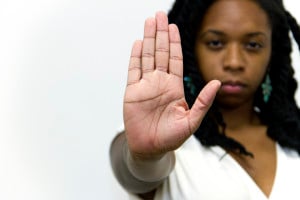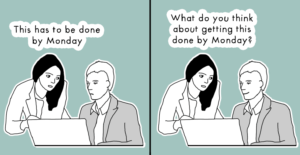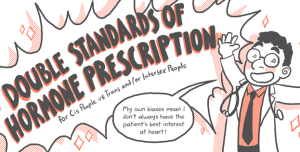Pidgeon: Raise you hands if you have testes.
Words on screen: Buzzfeed presents, What it’s like to be intersex.
Pidgeon: I’m Pidgeon.
Alice: I’m Alice.
Emily: I’m Emily.
Saifa: Saifa. And we are intersexy.
Words on screen: What does intersex mean?
Emily: Intersex describes a person who doesn’t fit the typical definition of male or female.
Words on screen: They may have variations in their gonads, chromosomes, or genitalia.
Alice: I have XY chromosomes, but typical female genitalia.
Emily: I’m a girl who has testes and XY chromosomes.
Pidgeon: I identify as a queer gender non-conforming intersex person.
Saifa: I identify as a black intersex male.
Words on screen: 1 in 2,000 people are born intersex.
Pidgeon: Intersex is not new. It’s been around since the beginning of human existence. There’s probably even intersex dinosaurs, if you think about it.
Words on screen: Is intersex the same as transgender?
Emily: Transgender has to do with your gender identity, whereas intersex has to do with your biological characteristics.
Saifa: Often, intersex people get surgeries that they don’t want and transgender people have to fight for surgeries that they do want.
Words on screen: Doctors often perform “normalizing” surgery on intersex people without medical reasons.
Saifa: They gave my mom the excuse that the internal testes were cancerous, that I would develop cancer.
Pidgeon: They didn’t even come out with an excuse basically in terms of health-related reason. They just said it was just about the appearance.
Emily: A lot of doctors are very uncomfortable with the idea that I have testes, and they’re still trying to get them removed. But I’m perfectly healthy, and there’s nothing wrong with them.
Words on screen: Medical records are often kept secret from intersex people.
Alice: They did a surgery to remove my testes and told my parents to take me home and just raise me as a girl, and I didn’t find out about it myself until I was twelve.
Saifa: There aren’t a lot of options, or medical providers don’t explore other options.
Words on screen: Doctors removed Saifa’s testes at age 13 because they “may cause cancer,” even though he always identified as a boy.
Saifa: My mom would put me in dresses, and she would be like, “Oh, aren’t you so cute and you’re so pretty.” And I’ll be like, “No, it’s horrible.” I was put on hormonal treatment which consisted of estrogen and progesterone.
Words on screen: Saifa conformed to his assigned female identity until the age of 25.
Saifa: I just wanted to belong, I wanted to fit in, I didn’t want to be different. So even though I knew something felt amiss, I conformed.
Words on screen: Saifa recently met with the doctor who removed his testes. The doctor had no regrets about the operation.
Saifa: He was very condescending. He was like, “You intersex activists don’t know what you’re talking about.”
Words on screen: The unnecessary surgeries still continue today.
Emily: It’s difficult for intersex people to find each other because from an early age we’re taught not to talk about our bodies.
Saifa: I did feel like I was the only one.
Emily: My doctors always told me there was nobody else like me and so it just perpetuates a vicious cycle of shame and stigma that we can’t break out of.
Words on screen: What message would you give to an intersex person?
Emily: I would tell another intersex person that you are worthy, you are lovable.
Saifa: Your body is beautiful. You’re beautiful.
Alice: Intersex people don’t need to be fixed. There’s nothing wrong with them.
Pidgeon: I know you feel like you might not be able to get through this. I know you might have really dark thoughts. But I want you to know that meeting other intersex people and finding a community or a support group can be one of the most important aspects in your healing process. And we’re out there, we’re out here, we’re here. And I just hope you can find us.




















